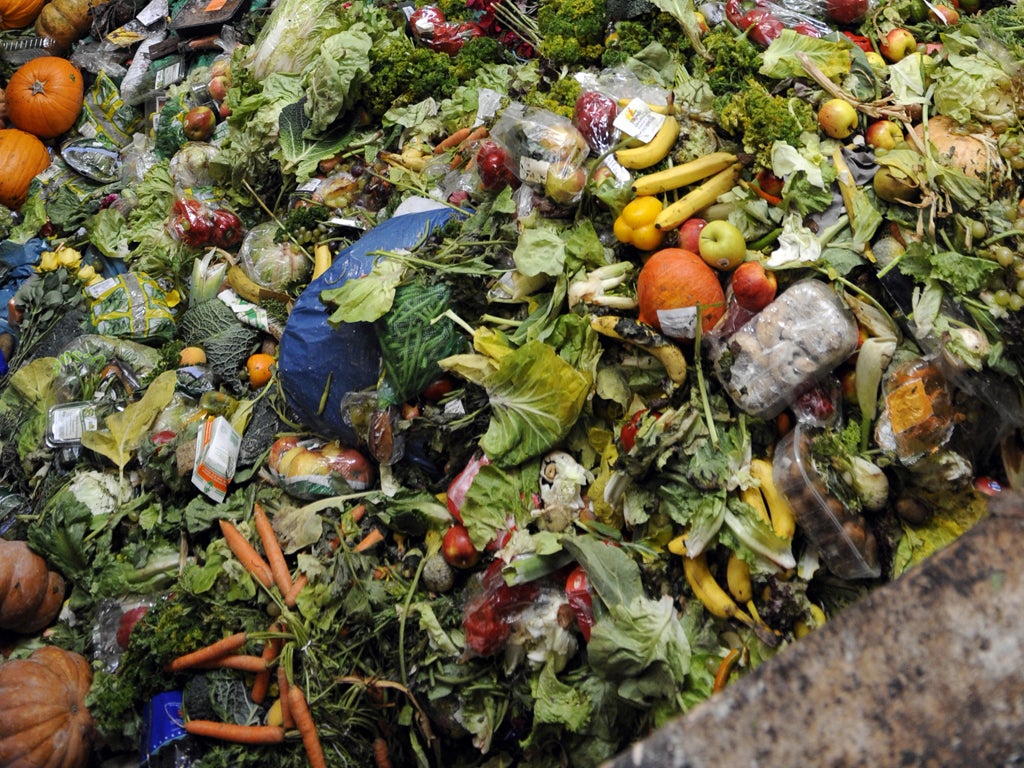Half of the world's food is thrown away? Come on, supermarkets: give us ‘imperfection’
Special offers that go mouldy in the fridge are partly why people throw so much food away

Every Sunday morning, in a working-class suburb of Granada, there is a crowded, sprawling market.
Unlike the city centre, which is decidedly posh, it bustles with immigrants from North Africa and local farmers with strong Andalucian accents. They sell misshapen vegetables, twisted red and green peppers which taste wonderful roasted with olive oil and garlic, and tomatoes so juicy they’re almost splitting open.
None of it costs very much, and shoppers leave the market with carriers bulging with the kind of produce you’ll never see on the shelves of a British supermarket. These vegetables are grown locally, for taste rather than appearance, and bought by people who may be poor but know how to cook. It’s very different from the way we shop and eat in the UK, and goes a long way towards explaining the shocking statistics in a new report from the Institution of Mechanical Engineers. According to the report, up to half the food produced in the world each year – two billion tonnes – ends up being thrown away.
That’s indefensible when so many people go hungry in the developing world. Over-supply isn’t even good for those of us who live in affluent countries, distorting our ideas about food and creating alarming levels of obesity. The report cites poor transport and storage infrastructure as one cause of the problem, but it’s impossible to ignore the role of the big supermarkets, which have encouraged people to be fussy eaters. Here’s another statistic from the same report: up to 30 per cent of vegetable crops in the UK are not harvested because their physical appearance doesn’t meet the expectations of consumers.
Supermarkets demand “cosmetically perfect foodstuffs”, says Dr Tim Fox, the head of energy and environment at the Institution of Mechanical Engineers. The result is a disordered relationship with food which has disastrous effects on our health, cooking habits and farming. What we have in this country isn’t so much choice as the illusion of it: I know supermarkets are convenient, which is why I use them, but what’s actually on their shelves? Look at the average vegetable counter, where everything is bright and shiny and symmetrical, quite unlike the vegetables in a French or Spanish market. How come every single blueberry is the same size, with next to no taste?
I’m sure Independent readers know that not all tomatoes are red, any more than not all beetroot is purple or carrots orange, but you won’t find many alternatives on the high street. Black tomatoes are fantastic in salads. Golden beetroots are delicious roasted, and purple carrots are healthier than the orange sort; we’d be eating them as a matter of course if British supermarkets hadn’t conditioned us to believe that each vegetable comes in only one colour.
The result is a massive waste of land, water and energy resources as farmers find they can’t sell even slightly “imperfect” crops. That’s one end of the food chain; at the other, supermarkets encourage over-consumption with special offers that end up going mouldy in the fridge. Three-for-the-price-of-two offers are hard to resist but I do my best, knowing perfectly well that I won’t want to eat the same thing three days in a row; I’m sure they’re one of the reasons why half the food bought in Europe and the US is thrown away after it’s bought.
This kind of over-consumption emphasises the growing gap between the food-rich, who can afford to chuck unused food away, and the food-poor. The UK now has so many hungry people that food banks are springing up in towns and cities, providing emergency supplies to adults and children who don’t have enough to live on, let alone too much.
At the same time, millions of people have got into the habit of buying snacks and ready-made meals to stick in the oven. Excess weight is causing debilitating diseases and shortening life expectancy, so it isn’t as if all this so-called “choice” is producing healthy outcomes for the rest of us. On the contrary, convenience food has disrupted the process of buying, cooking and eating, changing our perceptions of food in the most damaging way. Eating has become another means of instant gratification, a way of changing mood, something to be got out of the way with the minimum time and effort.
I don’t want to romanticise the lifestyle of European peasants two or three centuries ago, before the industrial revolution. But there’s something ethically wrong about regarding food as so easily disposable, and it certainly suggests we’ve lost a sense of its value. There are very good reasons to think about what we eat, and one way of doing that is to restore the link between shopping, eating and cooking. I know people say they don’t have time, but I can’t help thinking about all those statistics showing how many hours the average person spends watching television.
For many people who live in towns and cities, cooking has become a chore. Supermarkets offer an easy solution but it isn’t really a solution at all, evidenced by the astonishing quantity of food we throw away. There are many things I like about the modern world, but this casual contempt for an inescapable relationship – food, cooking, health – isn’t one of them.
www.politicalblonde.com Twitter: @polblonde
Join our commenting forum
Join thought-provoking conversations, follow other Independent readers and see their replies
Comments